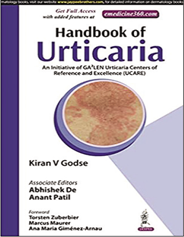Translate this page into:
Handbook of urticaria: An initiative of GA2LEN Urticaria Centers of Reference and Excellence
*Corresponding author: Arijit Coondoo, Department of Dermatology, KPC Medical College & Hospital, Kolkata, West Bengal, India. acoondoo@gmail.com
-
Received: ,
Accepted: ,
How to cite this article: Coondoo A. Handbook of urticaria: An initiative of GA2LEN Urticaria Centers of Reference and Excellence. Indian J Skin Allergy 2022;1:28-9.

Title: Handbook of Urticaria
Editor: Kiran V. Godse
Associate Editors: Abhishek De, Anant Patil
Paperback: Pages 128
Publisher: Jaypee Brothers, Medical Publishers (P) Ltd., EMCA House, 23/23-B, Ansari Road, Daryaganj, New Delhi - 110 002, India.
Although the symptoms of hives have been known for long, it was William Cullen who first introduced the term “Urticaria” in the 18th century since then a sea change has occurred in the knowledge about its etiology, classification, pathogenesis, and treatment. The simple mode of dividing urticaria into acute and chronic types has been challenged by various immunological and other concepts. Similarly, the treatment of urticaria continues to be an enigma. While antihistamines have remained the mainstay of treatment for years, they have often failed to provide perceptible and permanent relief to the patients. Hence, to improve their quality of life, various modern therapeutic modalities have been tried including development of newer antihistamines, up-dosing of antihistamines, and introduction of immunosuppressive drugs such as cyclosporin and biologics such as omalizumab. In this complex scenario, a comprehensive review to provide a lucid insight into the intricacies of the subject would always be welcomed by the students, teachers, and practitioners of clinical dermatology.
To meet this need for an updated insight about the disease, members of the global network of UCARE (Urticaria Centers of Reference and Excellence) have come together to compile a handbook “to increase knowledge of urticaria and to educate physicians who treat patients with urticaria.” The job of compiling and editing this book has been very efficiently performed by Dr. Kiran V. Godse and his UCARE team.
Dr. Godse is an academician of repute whose special interest in urticaria has inspired him to conduct a vast amount of research work in the subject. His immense knowledge about the disease entity and experience in treating patients of urticaria is reflected in the choice and distribution of chapters in this handbook. He has been ably assisted by an erudite younger dermatologist Dr. Abhishek De and Dr. Anant Patil. Each chapter has been written by national and international researchers on the subject. Indeed, the plethora of authors covers the entire gamut of experts on urticaria. Thus, Dr. Godse and his associate editors have ensured that the reader is served with evidence-based modern knowledge about the disease.
This paperback handbook has been designed to be quite handy for the reader’s perusal and reference work. It is divided into 22 chapters covering almost all the aspects of urticaria in a simple and comprehensive manner. Each chapter has been divided into subheadings making it easy for the readers to understand the nuances of the subject. Figures, flowcharts, and tables have been introduced wherever necessary and will prove very useful for the postgraduates to understand and memorize various concepts. However, one wished that some of the tables were in larger fonts to make them more comfortable to the eye. Some chapters such as “Patient-reported outcome measures” and “Patient education material” are quite innovative. Similarly, there are some excellent chapters on urticaria in special situations such as in children, in the elderly, in pregnancy and lactation, and in diseases of internal organs. The handbook includes a number of clinical photographs of good quality. However, there is a scope for improvement in the brightness and contrast of some of them.
Overall, Dr. Godse and his team must be commended for their effort to cover a complex topic in such a concise and lucid manner. Urticaria, however, is a disease whose intricacies keep unfolding day by day. Indeed, as has been mentioned in the introduction, various international organizations such as EAACI/GA2LEN/EDF/WAO update guidelines for the definition, classification, diagnosis, and management of urticaria every 4 years. Hence, one hopes that this excellent handbook shall be updated as and when the need arises with clearer photographs in subsequent editions.





